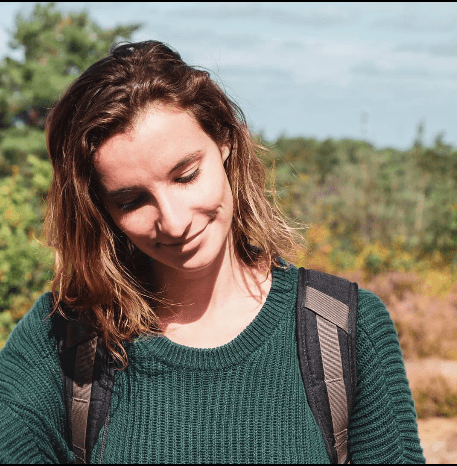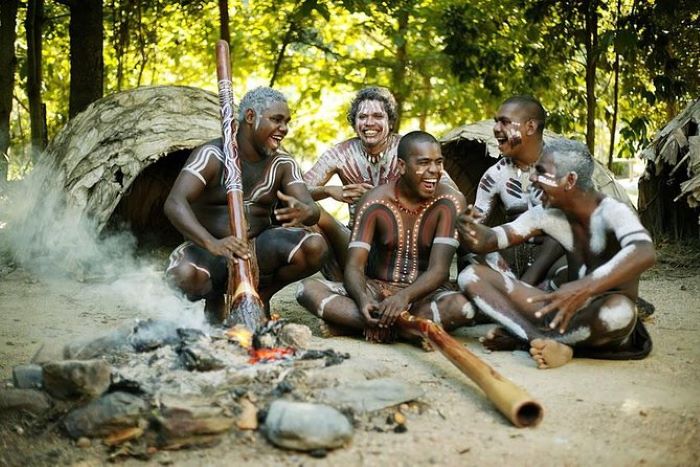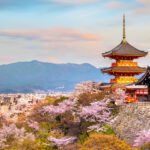When you’re in Australia, learning about indigenous Aboriginal culture is a must! Here in Queensland, there are still some people living in tribes in the original way. We thought this would be the best place to get an introduction!
On one of our days off in Cairns, we wanted to do something for the day and stumbled upon this cultural center: Tjapukai. It wasn’t too far from where we lived and we hadn’t done anything with indigenous culture before, so we decided to give it a shot!
 With our guide Dale
With our guide Dale
They offer a couple of different packages, during the day as well as the night. We thought we might as well go all out, so we opted for the general admission, cultural experience and the bush food trail. It’s not the cheapest activity, but it was well worth it and we had a great day! If you’re interested in learning more about the indigenous culture and history, this is a great day out. We’ll give you a little run down of our day so you’ll know what to expect.

Table of Contents
GENERAL ADMISSION
Upon arrival, we got greeted by Dale in the art gallery at the entrance. She was very welcoming and would be our guide for the rest of the morning. We got some traditional face paint and had a look around the gallery. We honestly didn’t expect it to be this interactive and thought we would have been exploring everything on our own with staff explaining us things every once in a while. We couldn’t have been more wrong! Our guide made it a very personal and tailored tour with heaps of information on indigenous traditions and culture.

You start off with a very impressive dance show and the creation story of this tribe. Here you see how the original people of the land use dance to tell stories. The creation story takes place in a 380° ‘cinema’ where image and two performers tell the tale of the tribe. I won’t spoil the story for you but it’s beautiful.
 The art gallery
The art gallery
Also included in the general admission are the boomerang and spear throwing, both way harder than they make it look! After learning about their use and how the weapons are made they demonstrate how to use them. Then the fun part starts and you get to try it yourself! Even though we weren’t very good at it, we had a blast trying!
 Joachim giving spear throwing a try
Joachim giving spear throwing a try
Up next were demonstrations about bush food and -medicine and traditional weapons. The demonstrations are really informative. They teach you a lot about how indigenous people and tribes use certain plants and trees to prepare food, to eat or treat any type of illness. We learned for example that lemon myrtle, besides making a lovely tea, is great for the skin, headaches and can even get you ‘high’ (don’t try this at home please!). Or that the minerals in termite mounts can be used to treat an upset stomach. The men showed us how and what weapons they use.
 The cultural artists performing traditional dancing
The cultural artists performing traditional dancing
One of the guides also showed us the fine art of playing the didgeridoo. Circular breathing, which is breathing in through your nose while expelling air through the mouth, is an important key for playing the didgeridoo. This is a true skill which has to be perfected over years. There is a shortage of people being capable of doing this, which is a shame because maybe one day, there might be no one left who’s able to play this fascinating instrument.
 Playing the didgeridoo is way harder than you would think!
Playing the didgeridoo is way harder than you would think!
CULTURAL CREATIONS EXPERIENCE
This package adds to the general admission includes making your own jewelry (we made a bracelet), learning how to weave palm leaves and painting your own boomerang. Laura really loved this last part! It was very interesting: Every boomerang had a different story on it, often with personal information about the painter. They originally painted with ochre (a natural earth pigment that comes in an array of colours).
 Painting our own boomerang
Painting our own boomerang  Weaving with palm leaves
Weaving with palm leaves
BUSH FOOD TRAIL
 Marie explaining all there is to know about bush food and medicine
Marie explaining all there is to know about bush food and medicine
Since we’re both very interested in native plants and their uses in food and medicine, we also opted for the guided bush food trail. A guide took us around the park, stopping at trees and plants, explaining their use to the native people of this land. It was really interesting to hear how every single tree or plant had a use! Either used as food, antiseptic for wounds, weaving baskets, to ease a sore stomach, .. there was something in nature for everything! Afterwards, we got to taste native damper (really soft dense bread) with jams of wild lime, Davidson plum and muntries.
 Traditional damper loaf, jams and tea
Traditional damper loaf, jams and tea
PRACTICAL
- Getting there – Tjapukai offers a bus service, but you could easily drive there yourself or even take public transport.
- Prices – it’s not the cheapest activity, but well worth its money. The price depends on what package you choose. Find a full list here.
- Food – There are a cafe and restaurant that offers snacks and a lunch buffet.c
There’s plenty more to see on http://www.tjapukai.com.au/ their website, so if you’re interested go have a look!

Have you been to Tjapukai and loved it? Send this to someone you want to take!

You might like these posts too:

Laura is the lead writer at BackpackBeliefs.com, where she specializes in travel guides, cultural exploration, and sustainable tourism. With over 10 years of travel experience and a Master’s degree in Cultural Anthropology, Laura brings valuable insights to her readers.
For the latest travel tips and updates, connect with Laura on Facebook at @backpackbeliefs and Instagram at @backpackbeliefs. where she has 4,622 followers.



